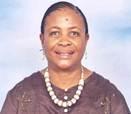The 2nd IASTED African Conference on
Health Informatics
AfricaHI 2012
Science and Technology - A Platform for Sustainable Development
September 3 – 5, 2012
Gaborone, Botswana
CONFERENCE CHAIR
Biography of the Conference Chair

Naomi Mmapelo Seboni is Head, School of Nursing, at the University of Botswana, Director, WHO Collaborating Centre for Nursing and Midwifery Development. Dr. Seboni obtained her Bachelors Degree in Nursing at the University of Botswana and Swaziland, Masters Degree at Teachers College, Colombia University, New York and her PhD at University of California in San Francisco (UCSF).
She taught several courses at the School of Nursing at the University of Botswana, namely Adult Health Nursing, Adolescent Health Care and Development, Theories of Nursing and Curriculum Development and Instruction.
Her areas of research and publications are adolescent sexuality and risk-taking behaviors, Adolescents living with HIV/AIDS, family and self care symptom management strategies for people living with HIV/AIDS and Home Based Care.
Dr Seboni is actively involved in professional service. She is the former President of the Nurses Association of Botswana, former member of ICN Council of National Representatives; member of STTI, where she served in ARISTA 3, Leadership Advisory Council and Service Advisory Council. She is a founder member of STTI African Chapter –Tau Lambda at large Chapter, and is its immediate past President. She also serves as a volunteer for International Planned Parenthood Federation (IPPF) at national, regional and international levels, currently she is a member of IPPF international governing council. Dr. Seboni served as a consultant and technical support for several international organization, namely UNICEF, UNFPA, PATH and WHO. At WHO she was part of the team that developed the strategic plan for nursing and Midwifery development in Africa, and also participated in WHO Regional workshops that addressed the issue of migration of nurses and the plans for scaling up nurses and midwives training in the WHO African Region.







